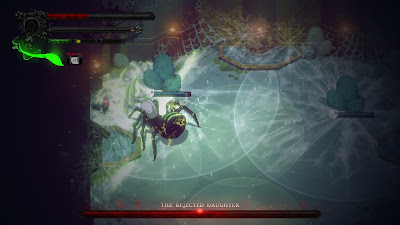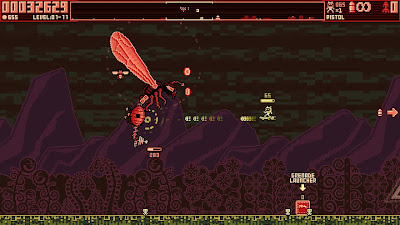I wish I could dodge sooner after an attack.
That single sentence is what delivers the fatal blow to Eldest Souls, a top-down boss rush that would be worthy of a recommendation if it just felt a bit snappier. I kept the thought from my mind for as long as I could, since the developer usually knows more about how their experience should play than an amateur tourist bumbling through their world. But every action your character performs is insufferably slow: attacking, charging, dodging, and casting are 0.2 seconds slower than the boss's next attack. And while I could tolerate it sometimes, being unable to dodge cancel out of the end of an attack animation wore me down by the end, especially during the game's DLC bosses. I don't think Eldest Souls is a bad game, but it's not my idea of a good time either.
As a general rule, I try my best to sympathize with the intent of a game designer. Rather than jumping to adjectives like "unfair" or "annoying" during a play session, I tell myself to remain inquisitive: what am I getting wrong about this fight? Is there something I'm missing from my repertoire? Is there a mechanic I'm overlooking? Staying open minded has allowed me to greatly enjoy unorthodox control schemes like Castlevania's fixed jump and Resident Evil's clunky tank controls. In both franchises the level design is molded around these restrictions, letting you survive so long as you take into account your own limitations. I get the gripes people have with them—deaths will come from your lack of total control—but I think the challenges they present are more interesting than they are troublesome. They taught me that limitations aren't always a bad thing; toppling a challenge while inhibited can be more gratifying than overcoming it at your best.
But man did I struggle to appreciate Eldest Souls's sluggishness. Part of it is that I think the attack animation lacks the appropriate weight: the blade swing is languid and the slash effect doesn't linger long enough, giving you the impression that the attack is over despite there being a dozen or so frames left to it. Watching your character stand in place while you jam on the dodge button doesn't feel good, even if it might make sense balance-wise to force the player to commit to their attack. I never got used to how rigid combat felt either, as even on my replay run I found myself getting caught by enemy attacks I was instinctively trying to dodge out of. Fight by fight, my enjoyment for Eldest Souls was continuously stretched thin, its restrictiveness revealing that even classic-vania fans have their limits.
Of course, another reason your character feels like an octogenarian fresh out of the hospital is because bosses are spry and quick. The first two bosses of the game are a fair and measured challenge, but after that the gloves come off and you get the real Eldest Souls experience: area of effect spam. The battlefield will light up in a tapestry colors as you blow through your stamina trying to get away, all while the boss primes their next attack (or two) before the first is gone from the battlefield. The worst offenders of this are Eos, Warden, Hyem, and the DLC bosses—which is almost half of the entire boss roster. When Eldest Souls is at its best it'll feel like a proper duel with an extra degree of danger (like with Azikel and the final boss) but for the rest of the fights you'll feel like you're trying to dodge strobe lights at a rave—except instead of taking ecstasy you've been gobbling downers.
To offset the enormous advantage the bosses get, Eldest Souls hands you three distinct skill trees that can be leveled up after each of your victories. Throw in boss souls that can be used to modify your existing abilities, and there's a shocking amount of choice here: you can basically play through the game six different times before having to resort to a similar build. Unfortunately, since progressing your skills is gated by boss victories, you'll have to churn through the first couple fights before your build comes into its own—and by that point you're halfway through the journey. The first four bosses have to be fought in roughly the same order too (with #3 and #4 able to be swapped), further hammering in the early-game sameyness. And while NG+ lets your carry over your unique build, it ratches up the difficulty to such an absurd degree that you may as well start practicing no-hit runs after you beat it.
Beyond the boss fights, there's not much else propping up the world of Eldest Souls. The environmental art is excellent and the sound design captures your attention a shocking number of times, but all else falls by the wayside. The music is okay, enemy design is fairly cartoony, animations are barely adequate, and the story is so astonishingly paper-thin that none of it is worth reading. The lore references kings and characters you'll never meet and that never matter, pulling your attention away from the ostensibly rad, mad gods that plague the land. NPCs are one-note cryptic weirdos copied over from Dark Souls, bosses have zero dialogue, and you never really get a feel for what this kingdom was like as a whole—other than the fact that they were a monarchy that owned slaves, which doesn't really encourage you to save this wretched world.
Lastly, kudos to the developer for offering three DLC boss fights for free, but the player should beware: these are some super-charged challenges. These three nightmares flood the arena with hazards and damage at an alarming rate, easily trapping you in a death combo if you run out of stamina for dashing. Ironically I found the last boss to be the most "fair" as he had a distinct mechanic you had to play around, while the second boss (spider lady) was a serious roadblock for me. Between the slow webbing, the poison, random fountain prompts, and her absurdly-fast movements (seriously, what's with that spin attack?!), the battle encapsulated everything that drove me up a wall about Eldest Souls. These fights are a cool set of bosses on paper, but a frustrating damage-roulette in practice.
Eldest Souls certainly has its meritorious moments, but for me there's like half a dozen other top-down games that get their combat right that I can't help but chide this one when it flounders. There are other criticisms I could lob at the game that I've heard from other players—can't dash through enemies, easy to get stuck in a corner, high boss HP pool—but I feel that they're negligible compared to the lack of dodge canceling. I appreciate the developer adding in a (bafflingly) robust skill tree for such a small game, but that alone can't save it; Eldest Souls is a swing and a—wait ten frames—miss.






























